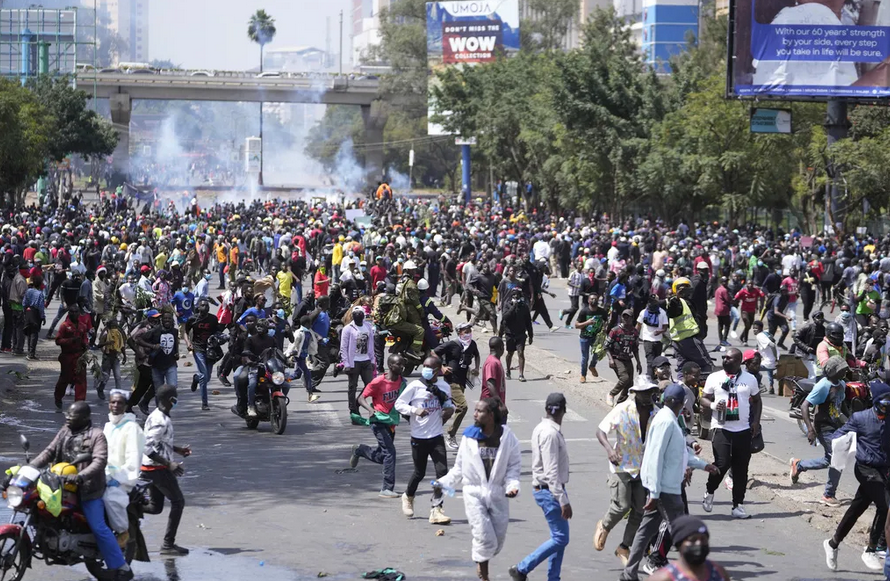
Part of Kenya’s parliament building was burned Tuesday as thousands of protesters against a new finance bill entered and legislators fled, in the most direct assault on the government in decades. Journalists saw at least three bodies outside the complex where state forces had opened fire, and medical workers reported five others killed. Clashes spread to other cities.
Protesters had demanded that legislators vote against the bill imposing new taxes on a country, East Africa’s economic hub, where frustrations over the high cost of living have simmered. President William Ruto was elected with promises of economic relief, which proved to be a ruse, as he drifted closer to US imperialism.
Lwmakers voted to pass the bill, then fled through a tunnel as protesters, many of them youth, outmaneuvered police to enter the building and they proceeded to torch the parliament.
At least five people were shot dead while treating the wounded, the Kenya Medical Association and other groups said in a joint statement. It said more than 30 people were wounded, at least 13 with live bullets. One person shot dead was wrapped in a Kenyan flag and carried away. Another lay on the sidewalk, their head in the gutter.
As the sun set hours later, Kenya’s government still had no comment. Internet service in the country noticeably slowed in what NetBlocks called a “major disruption.” Ruto was outside Nairobi attending an African Union retreat. He had been expected to sign the finance bill into law this week and has two weeks to act.
The office of the Nairobi governor, a member of the ruling party, was also briefly on fire, with smoke pouring from its white facade. The office is located near parliament. Police water cannons were used to extinguish the fire.
Protesters could be heard shouting, “We’re coming for every politician.”
Police fired live ammunition and threw tear gas canisters at protesters who sought treatment at a medical tent at a church near parliament. Elsewhere, Kenyatta National Hospital said it received 45 “victims,” though it was not clear if any were dead.
The Kenya Human Rights Commission shared a video of officers shooting at protesters.
Youth last week announced they were uniting to keep the government in check as prices for fuel, food and other necessities have soared. In Nairobi, a regional hub for expatriates and home to a major United Nations complex, the inequality among Kenyans has sharpened along with long-held frustrations over state corruption.
Opposition to the finance bill has united a large part of the country, with some explicitly rejecting the tribal divisions that have torn Kenya apart in the past. Some who had passionately supported Ruto felt betrayed.
“I fell for his lies. Now I’m out here regretting why I voted for him,” youth Oscar Saina said.
As throngs of protesters rushed through the streets, defiance emerged elsewhere in the country Tuesday — including in the town where Ruto was, Naivasha, as protesters chanted “Ruto must go.”
Protesters tried to storm the State House in the western city of Nakuru, a witness said. There were clashes in the western lakeside city of Kisumu. The governor of Mombasa, Kenya’s second largest city, joined protesters outside his office and expressed his support for them.
Protesters burned ruling party offices in Embu in central Kenya, the Nation newspaper reported. Citizen TV showed footage from Nyeri in central Kenya with police confronting protesters in the smoking streets.